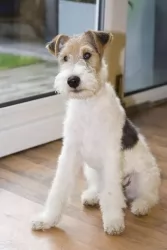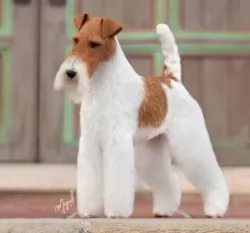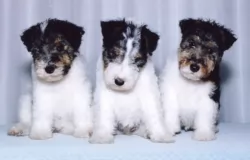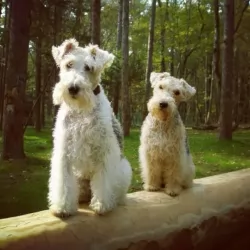 MyDogBreeds
MyDogBreeds Wire Fox Terrier is originated from United Kingdom but Eurohound is originated from Norway. Wire Fox Terrier may grow 33 cm / 12 inches shorter than Eurohound. Wire Fox Terrier may weigh 15 kg / 33 pounds lesser than Eurohound. Both Wire Fox Terrier and Eurohound has almost same life span. Wire Fox Terrier may have less litter size than Eurohound. Wire Fox Terrier requires Moderate maintenance. But Eurohound requires Low maintenance
Wire Fox Terrier is originated from United Kingdom but Eurohound is originated from Norway. Wire Fox Terrier may grow 33 cm / 12 inches shorter than Eurohound. Wire Fox Terrier may weigh 15 kg / 33 pounds lesser than Eurohound. Both Wire Fox Terrier and Eurohound has almost same life span. Wire Fox Terrier may have less litter size than Eurohound. Wire Fox Terrier requires Moderate maintenance. But Eurohound requires Low maintenance
 The wire fox terrier was developed in England by fox hunting enthusiasts. They wanted a feisty dog that could chase foxes down their burrows.
The wire fox terrier was developed in England by fox hunting enthusiasts. They wanted a feisty dog that could chase foxes down their burrows.
It is thought that the dog descended from the rough-coated black and tan working terriers of Wales.
The dog wasn’t popular as a pet until the 1930s when its appearance in certain films gave it a popularity-boost.
 Sled dog racers wanted something unique and hardy in their dogs and the Eurohound seemed to be the dog that fitted the bill.
Sled dog racers wanted something unique and hardy in their dogs and the Eurohound seemed to be the dog that fitted the bill.
It was in the 1980s that both Norway and Sweden started crossing the Husky and the Pointer for the first time.
The Eurohound, known also as the Scandinavian hound, is a cross between a German Shorthaired Pointer and an Alaskan Husky as well as other Pointer dogs.
Hailing from Norway, Scandinavia, it isn’t a purebred dog but a cross-breed, and the term ‘Eurohound’ comes from a certain Ivana Nolke so as to distinguish the European racing dogs imported into Alaska.
 The Wire Fox Terrier is a sturdy, medium-sized dog that weighs between 7 and 9kg and stands between 35 and 39cm at the withers.
The Wire Fox Terrier is a sturdy, medium-sized dog that weighs between 7 and 9kg and stands between 35 and 39cm at the withers.
The dog’s double coat is essentially white with brown or tan markings and can be medium length and wiry, tending to be curly too.
He is a light shedder. The face is long, without much shape and eyes appear to be fairly close together. The ears are fairly small and they fold forward toward the cheeks. The tail is docked and is held high.
This really is an intelligent dog and can’t tolerate being bored. It’s essentially a companion dog too and doesn't want to be separated from his owners for too long.
As a companion dog he is going to want a lot of attention. They’re independent and strong-willed and will benefit from training and socialization.
They are great around children but they do need to be supervised as they are inclined to nip, especially when highly excited. They also bark quite a bit and the owner might have to do something to stop this yapping, especially when the dog is bored.
 The Eurohound is a carefully bred dog considered to be a large dog standing up to 72 cm in height and weighting in the region of 18-24 kg.
The Eurohound is a carefully bred dog considered to be a large dog standing up to 72 cm in height and weighting in the region of 18-24 kg.
With its mission being to be a sled dog, it is constantly being crossbred with other cross- breeds to produce dogs to suit the pulling of sleds. Because both the Husky and Pointers have been used in its breeding, who knows really how its appearance will be as it can vary quite a bit.
There are however, some common features in the dogs such as the half dropped ears. More Eurohounds have black ears with white markings. The dog is a slender breed with a longish face and a long muzzle. Certainly it is known for being a powerful sled dog. The short, shiny dog can be in a number of colors such as cream, beige white, red, black, spotted or patched.
Social, extrovert and energetic, the Eurohound also loves to be busy. Its a dog who forms a strong relationship with its owners, being affectionate and loyal. While he is quite able to live in the city or the country, he essentially needs large premises as he loves to run and be free.
He most certainly isn’t a working dog breed who can be left on his own in the backyard until you need him to pull a sled as he craves your companionship. He is an independent and stubborn dog and therefore training and socialization will b excellent for him as it makes him understand who is boss in the home.
He is a dog who gets on well with other pets in the home as well as children.
 The Wire Fox Terrier is such a canine friend, ready to be with you no matter what you’re doing. They are social dogs and love being involved with their human companions.
The Wire Fox Terrier is such a canine friend, ready to be with you no matter what you’re doing. They are social dogs and love being involved with their human companions.
He is independent but still social and enthusiastic and you can describe him as the ideal family dog.
He is a bundle of energy, and when you bring him into your home, you’re going to get a family member who is playful, joyful, loving and loyal – your very best friend.
 Full of bounce, social and extroverted, while also being independent and stubborn, the Eurohound just loves being around his human family, bonding strongly with them, whether they are adults, children or even other pets in the home.
Full of bounce, social and extroverted, while also being independent and stubborn, the Eurohound just loves being around his human family, bonding strongly with them, whether they are adults, children or even other pets in the home.
You’ll find that your Eurohound is an intelligent dog too and that he can be easily trained. He loves to be active, so to put him in your backyard and all but forget about him would be cruel. They are loyal, loving dogs who want to be part of all your activities, being ready to walk and run with you whenever the opportunity arises.
 These are healthy dogs, and if you get your dog from a responsible breeder, he will have been checked for health conditions such as cataracts, hip dysplasia, and luxating patellas.
These are healthy dogs, and if you get your dog from a responsible breeder, he will have been checked for health conditions such as cataracts, hip dysplasia, and luxating patellas.
Cataracts are a problem with the lens of the eye. The lens focuses light and it should be crystal clear. A cataract obscures vision. Sometimes the cataract can be very small but other times it can grow to the size of the lens and then it can cause blindness.
Most times, dogs with cataracts can still see, and even though a dog may experience some confusion with a cataract, they don’t hurt the dog. They don’t go away on their own and will need to be removed surgically. If you see your dog has a cataract, consult your vet to get their opinion on the matter.
Your dog may be licking and scratching a lot and it may just be that your dog has a frustrating and irritating skin problem. This itching isn’t a disease but rather a cause of some disease.
There could be so many things that are causing your pet to scratch and it could be a skin disease, parasites or allergies. It can be terrible seeing the frustration it causes your pet and he will certainly need to see the vet.
 Considered as a healthy dog breed and able to live up to 10 – 15 years of age, just some of the most common reported health problems you might find with your Eurohound are hip and elbow dysplasia.
Considered as a healthy dog breed and able to live up to 10 – 15 years of age, just some of the most common reported health problems you might find with your Eurohound are hip and elbow dysplasia.
Hip dysplasia is where the joint – the ball and socket – is malformed so that instead of working smoothly it grinds. It is one of the most common skeletal diseases in dogs and large breeds are mostly affected. Hip dysplasia can lead to osteoarthritis, pain and lameness.
 This dog will need to be brushed regularly. Some people hand-strip their dogs. Most people prefer just to take their pets to a professional groomer to have them professionally clipped. The groomers will simultaneously clip his nails, clean the inside of his ears and also clean his teeth.
This dog will need to be brushed regularly. Some people hand-strip their dogs. Most people prefer just to take their pets to a professional groomer to have them professionally clipped. The groomers will simultaneously clip his nails, clean the inside of his ears and also clean his teeth.
The Wire Fox Terrier will expect you to supply him with high-quality dog food if you opt to use commercially manufactured dog food. These foods can be wonderfully convenient but you want the food to be packed with natural ingredients and be high in vitamins and minerals.
Any diet should also be appropriate to the dog’s age, his size, and his activity levels. Some homemade foods can also be a treat but this needs to be simple with no heavy spicing. Things such as boiled chicken, brown rice and vegetables can be an excellent choice.
 The Eurohound is an energetic dog who will require a high-quality nutritious food. Home made dog foods are wonderful but in the event that it isn’t always possible, make sure you buy top quality commercially manufactured food.
The Eurohound is an energetic dog who will require a high-quality nutritious food. Home made dog foods are wonderful but in the event that it isn’t always possible, make sure you buy top quality commercially manufactured food.
Your vet can advise you on the type of food to use for your pet if you are unsure. Certainly, if you feed your dog kibble, take a good look at the ingredient label on the pet food packaging. If you are interested in your dog’s health in terms of food, you will learn about protein/fat ratio and how much moisture is in the food and what vitamins are included.
Remember to occasionally include cooked brown rice, vegetables and chicken as well as some raw meat from time to time.
The Eurohound isn’t a big shedder but you will still need to ensure that you brush his short coat twice a week to keep it in tip top condition.
These are dogs which bond closely with their human family so this grooming period will be therapeutic to him.
Check his ears inside and out for the development of ear infections and brush his teeth twice a week with a special dog toothbrush and tooth paste. Dental disease can cause a host of serious illnesses and you want to avoid this with your dog,